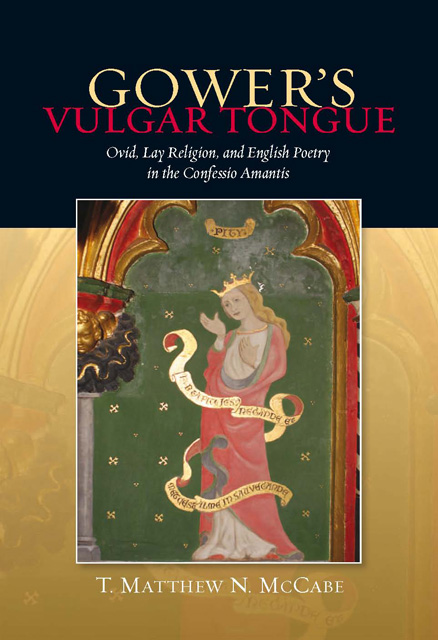Book contents
- Frontmatter
- Contents
- Acknowledgments
- Note on Abbreviations and Editions
- Abbreviations
- Introduction: Vernacularity and Public Poetry
- 1 Gower’s Ovidian Voice in English
- 2 English Writing and Lay Theology
- 3 At the Limits of Clerical Discourse
- 4 Kinde Grace
- 5 Ethics, Art, and Grace
- Conclusion: Gower and Public Poetry
- Bibliography
- Index
1 - Gower’s Ovidian Voice in English
Published online by Cambridge University Press: 14 February 2023
- Frontmatter
- Contents
- Acknowledgments
- Note on Abbreviations and Editions
- Abbreviations
- Introduction: Vernacularity and Public Poetry
- 1 Gower’s Ovidian Voice in English
- 2 English Writing and Lay Theology
- 3 At the Limits of Clerical Discourse
- 4 Kinde Grace
- 5 Ethics, Art, and Grace
- Conclusion: Gower and Public Poetry
- Bibliography
- Index
Summary
The Confessio remains, like the Mirour and the Vox, a public poem, fundamentally concerned with urging a message of moral and political reform, but this English poem adopts a lower, more popular register than do Gower’s earlier moral and political compendia in French and Latin. This chapter develops both these claims. It seeks first to establish the Confessio’s rhetorical and public basis by exploring the strong affinity that effectively unites the poem’s narrative, mythic, and obviously Ovidian portions, on the one hand, with its prescriptive, moral and political portions, on the other. Both kinds of writing are darkly colored by an Ovidian concern with division and changeability. Just as Gower shows a penchant for Ovidian metamorphosis both in the Prologue and in the tales of the confession, so, conversely, do we find a strong tendency towards satire and other forms of political writing in the tales, as well as in the overtly political Prologue. As a result, the Prologue constitutes a fitting prolegomenon to the confession, and the public themes it announces are indeed fundamental to the poem as a whole. This chapter also investigates the Confessio’s register and projected audience in light of these Ovidian affinities. As we will see, Gower’s fixation on the quintessentially Ovidian themes of division and mutability enables him to address an audience that, truly public and common, escapes the binaries of lay and clerical, demotic and elite.
“Upon a Weer”: The Prologue and the Shape of the Confessio
Critics have often remarked on the Confessio’s indeterminacy of genre. At turns love vision, lyric, exemplum, romance, and dit amoureux, the Confessio also variously resembles a confessional handbook, an estates satire, a didactic poem, and a mirror of princes. Even the seemingly omnivorous genre, compilatio, however fitting it may be, fails to assimilate everything: as Olsson notes, Gower’s self-representation evolves from compilator to auctor over the course of the poem. While shifts of genre are frequent in medieval literature, those of the Confessio are noteworthy because of Gower’s evident awareness of form. This is seen in Gower’s ballade sequences, the Cinkante Balades and the Traitié pour ensampler les amantz marietz, and in Gower’s refined and specifically Machauvian awareness of genre.
- Type
- Chapter
- Information
- Gower's Vulgar TongueOvid, Lay Religion, and English Poetry in the <i>Confessio Amantis</i>, pp. 11 - 67Publisher: Boydell & BrewerPrint publication year: 2011



